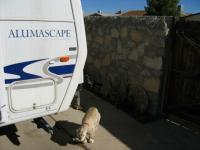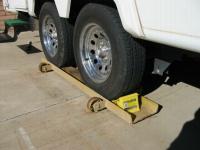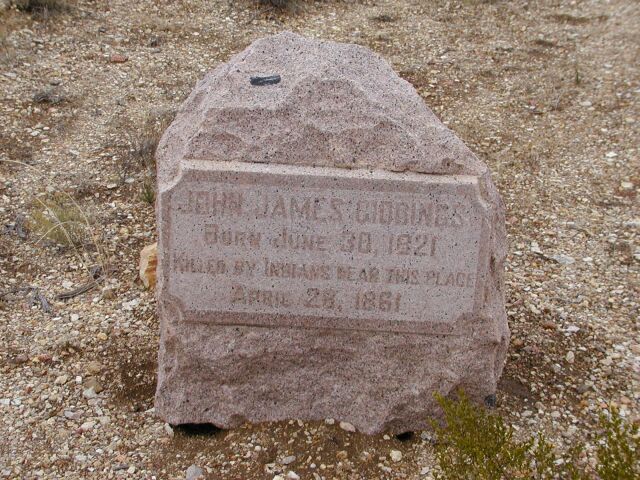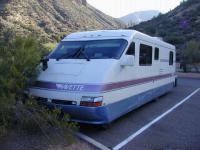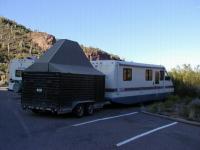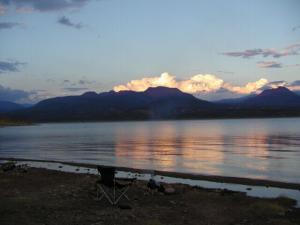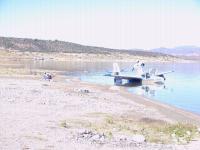Rock Hound State Park
New Mexico
It may have still been frosty when the wagons left Stein's Station that morning. The mules plodded steadily along through the deep sand, round and round through the serpentine bed of the arroyo. It’s a natural road when it hasn't been raining. Rain isn't likely out here. Winds blow, sometimes all the way from the North Pole. And clouds ball up black. But seldom do they drop much cargo.
Once in a great while, though, there is a wall of water.
The Indians were mostly reasonable. Not like the Comanche country east of El Paso, the badlands they had already passed through. The natives here were not unlike a sort of weather in their own right, the way they came and went. Mostly they just passed by. Certainly they were not generally so present as to impede progress.
The biggest worry on this journey was likely to be finding a sweet spring when they needed it.
It was late April, 1861. The men were probably not particularly worried. There were thirteen of them, in two wagons, well armed, and this was a regular, scheduled trip, completed twice a month without much incident. It was known that the Paymaster of the line, J. J. Giddings, was carrying upwards of $20,000, but no trouble had come of it. Giddings assured them he had surveyed this route and "was very friendly with the Indians and felt no fear of them." He had even contracted with Cochise himself to supply hay to all the stations between Messilla and Tucson, a distance of 300 miles.
"Cochise". In the Indian language, the word meant "hard wood". And indeed, along with supplying hay, the Indian leader worked as a woodcutter at the Apache Pass station. Not far ahead of them, in fact.
The men may have had no way of knowing that an inexperienced army lieutenant named George Bascomb, only days before, had come to Apache Station and accused Cochise of stealing cattle and abducting a young boy. The charge was denied, but Bascomb attempted to subdue him, and in the ensuing struggle 3 bullets were put into the Indian leader. He escaped by cutting through a tent, but several of his relatives present were subsequently hung.
The walls of the draw grew gradually lower. It was gloomy down there, and it would have been only natural for the men to feel some small brief relief to finally rise up out of it, and emerge onto the broad open saddle on the far side of Stein's Mountain, at the end of their lives.
-------------------------------------
These thoughts, or something like them, occupied me as I dragged the fifth wheel up Hwy 80. I left Douglas on Friday. The plan was to snake up the east side of the Chiricahuas, dump the trailer in the National Forest, and make my way over the pass to the National Monument in the truck.
So much for plans. It snowed heavily during the night, and I spent the entire weekend waiting for it to melt. Mostly reading about "the Hopi Way". I finally gave up this morning (Monday) and skittered on back down to the highway, headed north.
It is November 15th. My brother's birthday. On his advice, I am headed for Stein's Ghost Town, which is about the first group of weathered buildings you see, if you look quick, on the north side of I-10 going east into New Mexico from Arizona.
I'm searching for a lost bit of family history. I am looking for a grave.
Like all history, there's a bunch of begats in this. JJ begat JS, who begat JD, who begat Leonard, who begat me. That's the short version. But histories are seldom an exclusive inheritance, and the best have a way of wandering. I guess this one really began with Giles, who lit out of Susquehanna County in 1834 bound for Texas, got caught in the struggle with Santa Anna, joined Houston's ragtag army, was shot up at the battle of San Jacinto, and died of his wounds two months later. He was 24 years old. He didn't begat anybody. A brother, Jaybez, came down to settle his estate, liked what he saw, and settled in at Brenham.
Word got back, and soon there was a minor flood of brothers.
History is a funny thing. What seems at first straight-forward turns all squirmy as you delve into it, with lots of sidesteps and many an annoying minor character demanding to be heard. We stand upright upon the past, because there's little else to stand on. But it's a bit like slow quicksand. The deeper we get, the more present it seems.
At the risk of alarming the Reader, it might be well to firm things up a bit and slide a little fill in here, from a standard source. I quote from
www.tsha.utexas.edu ------------------------------------
"GIDDINGS, GEORGE HENRY (1823-1902). George Henry Giddings, pioneer mail-line operator and stage driver, was born on July 4, 1823, in Susquehanna County, Pennsylvania, the son of James and Lucy (Demming) Giddings. In 1846 he traveled with his brother J. J. to Texas, where they joined an older brother, Jabez Demming Giddings, who was practicing law in Brenham... Giddings was hired in the fall of 1847 by the San Antonio firm of C. J. Cook and Company as a clerk. Two years later he purchased that store and one operated by Cook in Franklin (El Paso). He operated both establishments until 1861.
During this time he took over operation of the San Antonio-Santa Fe Mail Line, which he assumed from its original owner, David Wasson. Congressional action confirmed the transfer of the route from Wasson to Giddings in August 1854, but it is generally thought that Giddings began operating the route as early as July of that year. The service operated the dangerous San Antonio-to-El Paso leg of the 1,100-mile route with one six-mule team, thirty-six additional mules, and a guard of seven men. From El Paso the number of guards was dropped to three, as the line covered the safer route on to Santa Fe. In 1855 Giddings lost 270 mules and sixty horses as a result of Indian raids. A small increase in government payments authorized in March was not sufficient to make the line a profitable enterprise. Though he constantly had to be replacing stations, livestock, and supplies, Giddings kept the line operating into 1857.
The San Antonio-San Diego Mail Line contract was secured by James E. Birch on June 22, 1857. Birch named George Giddings and M. B. Bramhall his agents on the "Jackass Mail," with Giddings operating the part of the route from San Antonio to El Paso. Upon Birch's death at sea in late 1857, Giddings continued to operate the mail line with help from Robert E. Doyle and Isaiah Woods. On March 5, 1858, Giddings purchased from Birch's widow the controlling interest in the SA-SD line. However, heavy losses continued to plague the line. The government again pledged to reimburse losses incurred, but the financial burden was much greater than anyone involved could have anticipated. By 1861 Indian raids and competition from the Butterfield Overland Mail Route combined to destroy the business.
With his mail contracts canceled and most stations and supplies lost, Giddings began a trip to Washington to plead for reparations. There he encountered an old friend, James Longstreet, who influenced him to join the Confederate Army, first as a procurer of needed materials and then as head of a volunteer militia along the United States and Mexican border. There Giddings commanded troops that fought the battle of Palmito Ranch, the last battle of the Civil War, a few miles outside Brownsville. "
--------------------------------------
There. Dry as dust. Dry as bones. These summaries usually are. In 1861 his accounts were in arrears, his contracts given over to President Buchanan's old friend Butterfield. Indians were smashing his stations as fast as he could build'em. And his brother was missing, in bloody circumstances. Perhaps Longstreet didn't really find it hard to beguile George with rebellion.
You have to give the Colonel credit though. He was the stubborn sort. He was still winning battles for the Confederacy for some period after Appomattox.
But it isn't George I'm off to find today. He ended up buried in Mexico City. I'm looking for his brother. I'm looking for JJ. I'm looking for my great great grandfather.
He left six children in San Antonio. All little, one unborn. His wife died a year later. The children were gathered up by a great aunt and bundled off to New York State, where they spent the war. Most of them made it back to Texas later.
I stopped at Stein's Ghost Town, spoke to the proprietor, Larry Link. He let me drop off the trailer there, and gave me directions to the ruins of the old station, across the railroad tracks and 14 miles up a soft dirt road. There's a cold wind, and it looks like rain. If this miserable track gets very wet, it's going to be hell getting back.
---------------------------------------
Less than a week after the massacre, Thomas Rogers, JJ's brother-in-law, came looking for him. The following letter is the only first hand account of his search that survives:
"Tucson, New Mexico
June 8, 1861
Dear Parents,
When I wrote you last, the 9th of May relative to the death of J. J. Giddings, I then thought to be able to give you all particulars as soon as the 19th, but it has been impossible to do so as there has been no mail communications between here and El Paso since he was killed.
The party was attacked at or near Steins Peak where we found the coach or all that remained of the running gear, but no trace of any portion of their remains where they had been buried or burned. And the only conclusion we could come to was that they had been taken prisoners, carried off and murdered. We found remnants of the clothing and a pair of gauntlets belonging to James which were covered with blood and which I have now sent forward to Mrs. J. J. Giddings by mail. We also found one mile this side, where they were killed, two men hanging up by their legs, where they were burned to death. Judging from the number of wigwams and where they had been encamped, there must have been about 150 Indians."
----------------------------------------
I found the ruins, and the arroyo, and followed it to the fence line separating New Mexico and Arizona. Larry said to follow the fence south until it doglegs west, then walk up the hill towards Stein's Peak. Then look back down. Nothing. Up here, one rock looks much like another. There are low bushes everywhere, though nothing resembling a tree you could hang someone from. It's cold. I could wander around out here for days.
| Wait. What's that? | 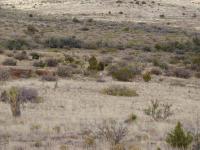 |
-----------------------------------------
( Extract from diary of Mrs. C. M. Noble written as the stage coach traveled through Apache Pass and Steins Peak on their journey from San Francisco, California to San Antonio, Texas in the year of 1861. )
"May 25,1861 Six miles from Apache Pass eastward. We came through the much talked of Apache Pass yesterday and were not molested by the Indians at all, though we stopped over two hours in the Pass to water, however we kept a strict lookout all the time. It was as bad a pass as had been represented. Close to the western end of the pass we saw 4 or 5 Indians hanging in 2 trees and farther on we saw the remains of some wagons where the Indians had taken some Spaniards and Cherokee Indians and tied them to the wagons and burned them - the grave where their remains had been interred. The sight made me feel bad.
Stein's Peak. We arrived here at about 8 o'clock last night. We traveled about 30 miles yesterday though according to the card it was only 25. We nooned at San Simon, Mr. Lowery's folks remained there. They withdrew from our train at Dragoon Spring because they could not have their way in all things. Our black horse gave out before dark and we had to leave him in the Pass. I felt very sad but was saved from repining and Moses and I united with thankful hearts in singing that verse
Thus far the Lord hath lead me on
Thus far His power prolongs my days
And every evening shall make known
Some fresh memorial of his praise.
It was after dark when we got to the station which was a ruin, situated close to the mouth of the canyon. As soon as the horses were watered, we left and came a mile and a half into the valley to grass. We heard at Tucson that 7 men had been murdered close to this station two or three weeks ago and this morning the bones of two of the men were found close to our camp. Our men carried them to the road side and buried them. They then piled stones on the grave and placed a board at the head on which was written as good a description of them as they could give."
-----------------------------------
| In 1917 Mrs. Annie Giddings Brown of San Antonio, daughter of JJ, went to Stein's Peak after corresponding with a Dr. Noble of Temple, Texas, who encouraged her to think she could find her father's grave after the passage of almost 60 years. She did find a grave, with a wooden headboard so weathered as to be unreadable. Upon returning to San Antonio she commissioned a stone marker and shipped it to the railroad depot at Stein's Pass Station, with money and instructions to place it on the grave. The gravestone sat in a corner of the depot for a little over two years, at which point a party of Mexican laborers were induced to place it in a wagon and haul it to the mountain. Not knowing where to put it, they picked a likely spot and set it up as best they could. | 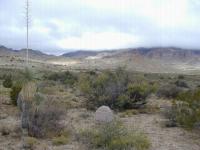 |
The true location of the grave, if there is one, can never now be known. Few could be sure of it in 1861. No one could in 1917. And certainly I am not now.
I found the marker, though:
John James Giddings
Born June 30 1821
Killed by Indians near this place
April 28, 1861
The lettering seems as crisp and unweathered as it must have been in 1917. It sits all alone on the northwest slope of Stein's Mountain, I suppose where the Mexicans left it. Take a right at the corner where the fence dodges west, count off 31 posts, look upslope. Small flat rocks, which serve as flowers in the desert, have been stacked in piles behind it.
I have seen these little cairns before. Many places. On top of mountains. Alongside trails. They are anonymous statements. Impromptu memorials. They say someone was here. Someone noticed. Someone made it this far. I added my rock.
It's been a long time, JJ. Thanks for life.
Rest in Peace.
Bob

